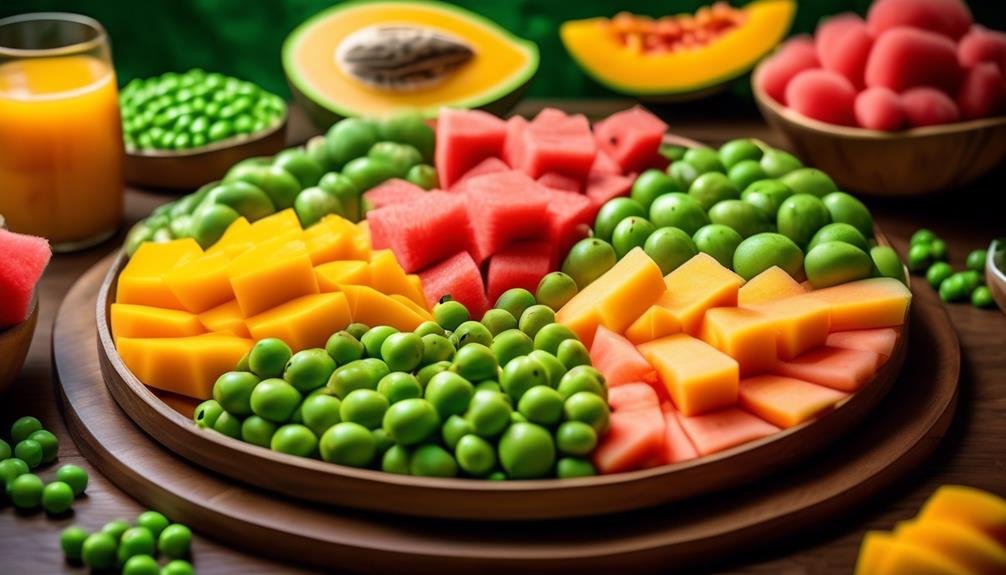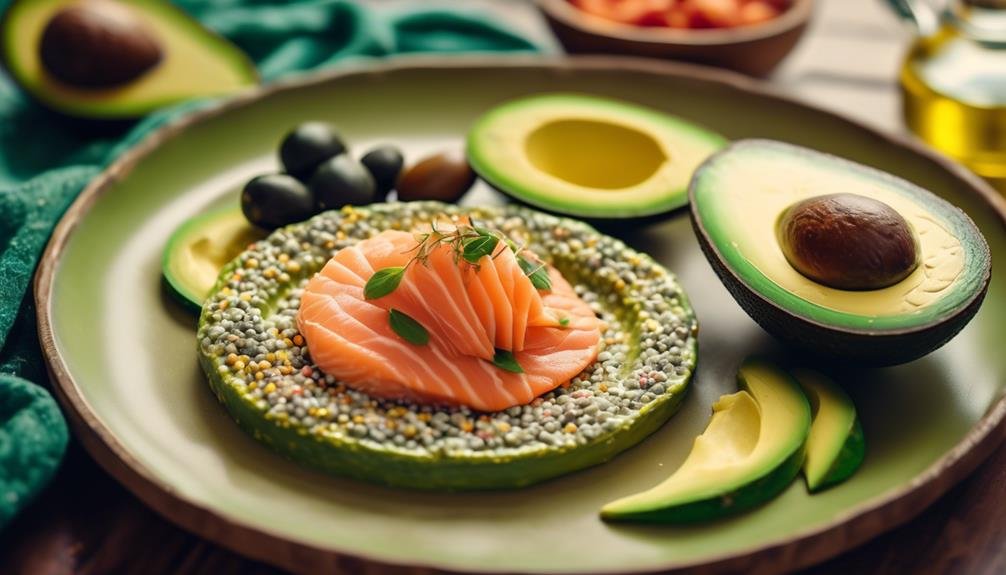"Cherishing Little Steps - A Haven for Baby and Family Journeys"
Healthy Eating at 8 Months
As your baby reaches 8 months old, their developmental milestones are rapidly progressing, and so are their nutritional needs. It's time to introduce solid foods, but where do you start? What textures should you introduce, and what fruits and vegetables should be on their plate? Don't worry, we've got you covered.
In this discussion, we will explore the essentials of healthy eating for your 8-month-old, from protein sources to healthy fats, and how to establish healthy eating habits for a lifetime.
So, let's dive in and discover what's best for your little one's growing appetite.
Key Takeaways
- Encourage language development by talking during mealtime, naming foods, and engaging in conversations.
- Offer a well-balanced diet that includes a mix of fruits and vegetables, protein-rich foods, and whole grains to support development.
- Introduce solid foods and encourage self-feeding to develop fine motor skills, explore different textures and flavors, and teach self-regulation.
- Introduce a variety of fruits and vegetables, protein sources, and healthy fats to provide essential nutrients for overall health and development.
Developmental Milestones
Are you curious about the important developmental milestones your 8-month-old should be reaching when it comes to healthy eating? At this stage, your little one is rapidly growing and developing, and their language development and motor skills are expanding as well. It's crucial to understand and support these milestones to ensure your child's healthy eating habits.
By 8 months, your baby's language skills are blossoming. They may start babbling, making new sounds, and imitating simple words. Encourage their language development by talking to them during mealtime, naming different foods, and engaging in interactive conversations. This not only enhances their communication skills but also creates a positive association with healthy eating.
In terms of motor skills, your 8-month-old is becoming more independent and may be able to sit up without support. They may also start to show interest in self-feeding by grabbing objects and bringing them to their mouth. Introduce finger foods that are appropriate for their age, such as soft fruits or cooked vegetables, to encourage their self-feeding skills and hand-eye coordination.
Nutritional Needs
To meet their growing needs, it's important to provide your 8-month-old with a variety of nutrient-rich foods. At this stage, your baby's nutritional requirements are increasing, and they need a well-balanced diet to support their development.
Here are some nutritional guidelines to keep in mind:
- Offer a mix of fruits and vegetables: Introduce a wide range of fruits and vegetables to provide essential vitamins, minerals, and fiber. Aim for a colorful plate that includes options like mashed bananas, pureed sweet potatoes, and steamed carrots.
- Include protein-rich foods: Introduce protein sources like cooked and pureed meats, fish, or legumes. These foods are important for your baby's muscle and tissue development. Start with small portions and gradually increase the amount as your baby grows.
- Introduce whole grains: Whole grains, such as oatmeal and brown rice, provide energy and important nutrients like iron and B vitamins. Offer them in a soft and easily digestible form.
- Practice portion control: While it's important to provide a variety of foods, it's equally crucial to ensure appropriate portion sizes. Offer small amounts of each food and let your baby decide how much to eat. This helps develop healthy eating habits and prevents overeating.
Introduction to Solid Foods

Now that you have established a nutritious foundation for your 8-month-old by meeting their growing nutritional needs, it is time to explore the exciting world of solid foods. Introducing your baby to solids is an important milestone in their development. It not only helps them learn new flavors and textures but also supports their oral motor skills and encourages self-feeding. When it comes to introducing solid foods, there are two popular approaches: baby-led weaning and purees.
Baby-led weaning involves offering your baby soft finger foods that they can grasp and feed themselves. This method allows babies to explore different tastes and textures at their own pace, promoting independence and self-regulation. On the other hand, purees involve blending or mashing foods into a smooth consistency that is easy for your baby to swallow. Purees are a great option if you prefer to control the texture and portion sizes.
To help you understand the differences between these two approaches, take a look at the table below:
| Baby-led Weaning | Purees |
|---|---|
| Encourages self-feeding | Allows for portion control |
| Develops fine motor skills | Smooth texture for easy swallowing |
| Explores different textures and flavors | Easier to introduce new foods and flavors |
| Teaches self-regulation | Promotes independent eating |
Introducing New Textures
When introducing new textures to your 8-month-old, it's important to gradually expand their palate and encourage them to explore a variety of foods. Exploring tastes and textures at this age plays a crucial role in developing your baby's sensory and oral motor skills.
Here are four feeding techniques to help you navigate this exciting phase:
- Start with smooth textures: Begin by offering purees and mashed foods. This helps your baby get used to the new sensation in their mouth and facilitates swallowing.
- Introduce soft lumps: As your baby becomes more comfortable with smooth textures, gradually introduce foods with soft lumps. This could include finely chopped fruits, vegetables, or small pieces of cooked meat.
- Offer finger foods: Finger foods are a great way to encourage self-feeding and improve hand-eye coordination. Soft, bite-sized pieces of cooked vegetables, fruits, or pasta can be easily grasped by your little one.
- Experiment with textures: Once your baby has mastered smooth and soft lumps, you can introduce more challenging textures. This might include foods with mixed textures like yogurt with fruit chunks or cooked grains with vegetables.
Variety of Fruits and Vegetables

Introducing a variety of fruits and vegetables into your 8-month-old's diet is essential for their overall health and development. At this stage, your little one is ready to explore new flavors and textures, and incorporating a wide range of produce can provide them with the necessary nutrients for growth.
When it comes to introducing fruits and vegetables, get creative with your recipes. Pureeing fruits like apples, pears, and bananas can make a delicious and nutritious snack. You can also try steaming or roasting vegetables like carrots, sweet potatoes, and broccoli to enhance their natural flavors. As your baby becomes more comfortable with different textures, you can introduce small pieces of soft fruits or well-cooked veggies for them to self-feed.
Incorporating organic produce into your baby's diet can offer additional benefits. Organic fruits and vegetables are grown without the use of synthetic pesticides and fertilizers, reducing the exposure to potentially harmful chemicals. They also tend to have higher levels of antioxidants and essential nutrients, which can contribute to your baby's overall well-being.
Remember to introduce new foods one at a time, waiting a few days before introducing another. This will help you identify any potential allergies or sensitivities. With a variety of fruits and vegetables in their diet, your 8-month-old will be on their way to developing a lifelong love for healthy eating.
Protein Sources
Including a variety of protein sources in your 8-month-old's diet is crucial for their growth and development. Proteins are essential for building and repairing tissues, supporting the immune system, and producing enzymes and hormones.
Here are four protein sources that you can introduce to your baby:
- Plant-based proteins: Legumes like lentils, chickpeas, and black beans are excellent sources of protein. You can puree them or mash them into a smooth consistency for your baby. Tofu and tempeh are also great options, as they provide a good amount of protein and are easy to digest.
- Animal proteins: Offer your baby small amounts of lean meats such as chicken, turkey, or fish. These meats are rich in essential nutrients like iron, zinc, and vitamin B12, which are crucial for your baby's development. Ensure that the meats are cooked thoroughly and mashed or shredded into small, easily chewable pieces.
- Yogurt and cheese: Dairy products like plain, unsweetened yogurt and soft, low-sodium cheese can be introduced as protein sources. They're packed with calcium, which is essential for bone development. Opt for full-fat varieties to provide your baby with the necessary healthy fats.
- Eggs: Soft-boiled or scrambled eggs are another great source of protein. They also contain essential vitamins and minerals. Start by offering your baby well-cooked and mashed egg yolks, gradually introducing the egg whites later.
Remember to introduce new protein sources gradually, observing your baby's response and any potential allergies. As always, consult with your pediatrician for personalized guidance on your baby's nutrition.
Healthy Fats

To continue providing your 8-month-old with a well-rounded diet, it's important to incorporate healthy fats into their meals. Healthy fats are essential for your baby's growth and development. They provide energy, aid in the absorption of vitamins, and support brain development.
Incorporating healthy fats into your baby's diet is easy. You can introduce foods such as avocados, which are rich in monounsaturated fats. Mash a ripe avocado and offer it as a spread on whole-grain toast or mix it into pureed vegetables.
Another option is to include fatty fish, like salmon or sardines, which are high in omega-3 fatty acids. These fats are crucial for brain health and can be pureed or flaked into your baby's meals.
Adding healthy oils, such as olive oil or coconut oil, to your baby's food is another way to incorporate healthy fats. These oils can be drizzled over cooked vegetables or added to purees.
You can also include small amounts of nut butters, like almond or peanut butter, as long as there are no allergies in your family.
Establishing Healthy Eating Habits
Establishing healthy eating habits is essential for your 8-month-old's long-term well-being and sets the foundation for a lifetime of good nutrition. At this stage, your baby is ready to explore new flavors and textures, and it's important to encourage self-feeding and establish portion control. Here are four strategies to help you inculcate healthy eating habits in your little one:
- Introduce a variety of foods: Offer your baby a wide range of fruits, vegetables, whole grains, and proteins. This will help them develop a taste for different flavors and ensure they receive a balanced diet.
- Practice portion control: Serve appropriate portions to prevent overeating. Start with small amounts and gradually increase as your baby's appetite grows. Remember, your baby's stomach is still small, so it's important not to overwhelm them with large quantities of food.
- Encourage self-feeding: Allow your baby to explore and feed themselves using their fingers or age-appropriate utensils. This promotes independence, fine motor skills development, and a positive relationship with food.
- Be a role model: Your little one learns by watching you, so make sure you model healthy eating habits. Eat together as a family, enjoy a variety of nutritious foods, and avoid using food as a reward or punishment.
Frequently Asked Questions
How Much Water Should My 8-Month-Old Baby Be Drinking?
Your 8-month-old baby should not drink water yet. Introducing solids too early can lead to nutrient deficiencies. Focus on offering a variety of nutritious foods to meet their hydration needs.
Can I Include Spices and Herbs in My Baby's Meals at 8 Months?
You can definitely include spices and herbs in your baby's meals at 8 months. Introducing new flavors and textures is beneficial for their development and helps them become more open to different tastes at an early age. It's also a good time to introduce allergenic foods.
Are There Any Foods That I Should Avoid Giving My 8-Month-Old?
To keep your 8-month-old healthy, avoid foods like honey, cow's milk, and large chunks of food that could be choking hazards. When introducing allergenic foods, do it one at a time to watch for any negative reactions.
Should I Still Breastfeed or Give Formula to My Baby While Introducing Solid Foods at 8 Months?
You should continue breastfeeding or giving formula to your baby while introducing solid foods at 8 months. Breastfeeding provides important benefits, while formula can also provide necessary nutritional value.
How Can I Ensure That My 8-Month-Old Is Getting Enough Iron in Their Diet?
To make sure your 8-month-old gets enough iron, introduce iron-rich foods like meat and legumes. These foods are like little powerhouses, giving your baby the fuel they need to grow strong and healthy.
Conclusion
So there you have it, introducing healthy eating to your 8-month-old can set them up for a lifetime of good habits.
While it may seem overwhelming at first, remember that every small step counts.
And don't worry if your little one doesn't immediately take to certain foods or textures. It's all part of the learning process.
Just keep offering a variety of nutritious options and let them explore at their own pace.
Before you know it, they'll be enjoying a wide range of fruits, veggies, proteins, and healthy fats.


